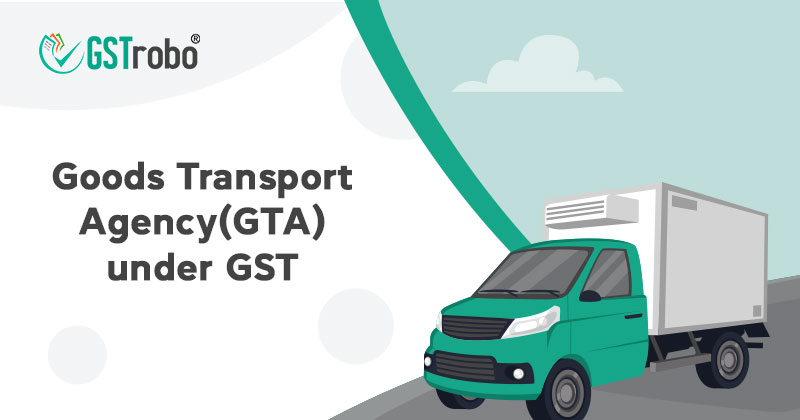Goods Transport Agency (GTA) under GST
The most common mode of transport for goods in India is by road. Transportation is an important aspect of the economy since any disruption in transportation undermines the entire supply chain. According to the NHAI, highways carry around 70% of goods and 80% of passenger traffic. A transporter or courier agency is responsible for the transportation of goods by road. The transporter, also known as the GTA, will be discussed in this article.

Services Exempted under GST
Here is the list of services that are exempt under GST
(a) By road, except for the services transported through:
(i) A goods transportation agency (GTA);
(ii) A courier agency;
(b) By inland waterways,
As can be seen, unless it is a service provided by a goods transportation agency, simply transporting goods by road is exempt from GST.
What is the Goods Transport Agency (GTA) under GST?
“Goods Transport Agency” is defined in Section 65B (26) of the Finance Act of 1994 as “any person who performs service in respect to the transportation of goods by road and issues consignment note, by whatever name called.” As a result, the issuing of a Consignment Note (C/N) was a fundamental and mandatory prerequisite, before any road transporter could be brought within the scope of the GTA.
Meaning of a Consignment Note (C/N) under Goods Transport Agency (GTA)
The term “consignment note” is not defined in the Act. The meaning of the consignment note is provided in the Explanation to Rule 4B of the Service Tax Rules, 1994, which can be used as guidance. According to the said rule, a consignment note is a document issued by a goods transport agency (GTA) in response to the receipt of goods to transport goods by road in a goods carriage, which is serially numbered and contains the
- Name of the consignor and consignee,
- The registration number of the carriage of the goods in which the goods are transported,
- Details of the goods transported,
- Details of the place of origin and destination, and
- The person liable for paying service
Person Liable to Pay GST under GTA Services
The recipients are responsible for paying GST if they fall under the reverse charge mechanism. In the case of transportation, there is a central tax of 6% transported via road. If the recipients are those listed below:
- Any factory registered with the Factories Act or is governed by it. Act No. 63 of 1948; or
- Any society that has been registered under the Societies Registration Act 1860 (Act No. 21 of 1860) or any other law in force at the time; or
- Any co-operative society founded by or under any law; or
- Any person registered under the CGST Act, the IGST Act, the SGST Act, or the UTGST;
- Body corporate that is incorporated or established by or under any law;
- Any partnership firm, whether registered or not under any law, including an association of persons; or
- Any casual taxable person.
Thus, in cases where GTA services are used by the above categories of persons in the taxable territory, the GTA supplier has the option of paying tax (and claiming ITC) at a rate of 12% (6% CGST + 6% SGST); if the GTA does not choose this option, the recipients will be responsible for paying GST. In all other circumstances, when the beneficiaries do not fit into one of the categories listed above, the supplier of GTA services will be held liable.
GTA Services That are Specifically Exempt under GST
A GTA is exempt from paying tax on the following services:
Services provided by a goods transport agency in the form of transportation in a goods carriage of:
- Agricultural produce;
- Goods, where the consideration charged for transportation of goods on a consignment transported in a single carriage does not exceed INR 1,500;
- Goods, where the consideration charged for transportation for a single consignee does not exceed INR 750;
- Milk, salt, and food grains such as flour, pulses, and rice;
- Organic manure;
- Newspapers or magazines registered under Registrar of Newspapers;
- Relief materials intended for victims of natural or man-made disasters, calamities, accidents, or mishap; or
- Defense or military equipment.
Similarly, the following services received by the GTA are exempt under GST
- Providing services on a contract basis:
- To a goods transportation agency, a mode of goods transportation.
As a result, if the GTA rents a mode of goods transportation, no GST is charged on the transaction.
Conclusion
In short, the GST law keeps the same rules as the previous Service Tax regime. Because pure transportation of goods services is largely performed by individuals in the unorganized sector, the law has specifically exempted them from the tax net. In most situations, or unless the GTA has taken the option to pay under a forwarding charge, the beneficiaries are held liable for those who provide agency services in transportation.
